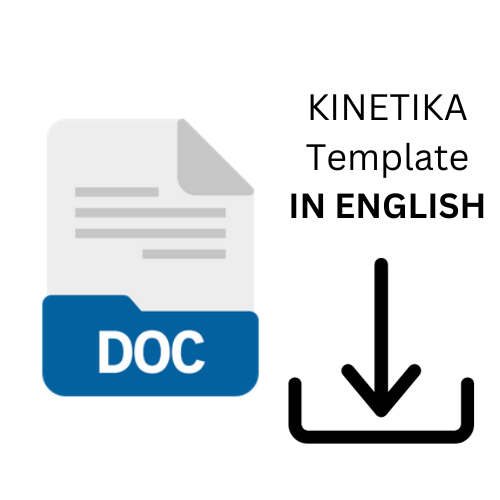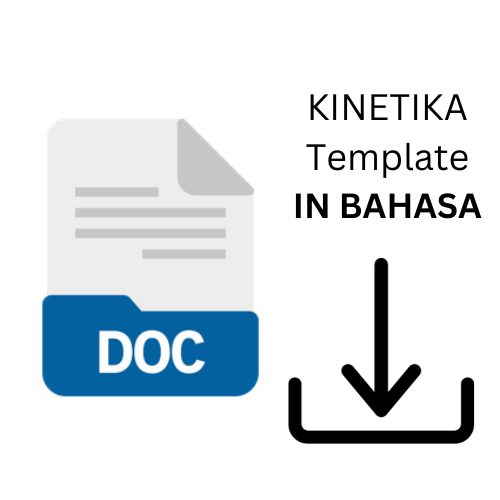About the Journal
Focus and Scope
- Energy and Conversion Technology
- Chemical Reaction Technique
- Chemical Kinetics, and Catalysis
- Transport Phenomenom
- Chemical Engineering Operating Unit
- Designing, Modeling, and Process Optimization
- Separation and Purification Unit
- Material Technology, Material Development, New and Advanced Material
- Food Technology and Bioprocess.
- Chemical Process and Industry
- Industrial Fieldwork
Open Access Policy
This journal provides immediate open access to its content on the principle that making research freely available to the public supports a greater global exchange of knowledge.
Publication Frequency
KINETIKA journal is published 3 (three) times a year, on March, July, and November. We accept the manuscript in Bahasa and English.
Peer Review Process
- Articles that submitted to the OJS system will then go through first check stage, which consists of two phases, namely (1) KINETIKA template suitability check (templat can be downloaded via the provided link on the website); and (2) Similarity index check using the Turnitin application with the allowed similarity index maximum of 25%.
- After completing the fist check stage, the article will then be reviewed by the reviewers based on the article's topic.
- Article review policy using double-blind review.
- Notification of acceptance or rejection of article is made a maximum of 1 week after the author revises the manuscript. If there isn't notification from the editor beyond the deadline, the author has the right to contact the editorial board to confirm the manuscript's status.
Plagiarism Screening
KINETIKA does not tolerate any existing plagiarism. Therefore, every articles received and published on KINETIKA will be checked the authenticity of the paper by using a similarity index. In addition, the application such as Turnitin will be used in order to prevent the plagiaris, with a maximum allowed similarity index of 25%. If the article is indicated to be plagiarized, the article will be rejected and it will not be reviewed.
Reference Management
Each article is accepted and published on KINETIKA recommended to used the application for reference manager such as Mendeley.
Publication Ethics
KINETIKA Publication was established in order to improve the quality of the journal and the professionalism of authors, editors, reviewers, and journal managers. This scientific publication ethis is expected to prevent malpractice in journal publishing and as a safety from copyright infringement, such as duplication and plagiarism. This scientific publication ethic refers to Peraturan Kepala LIPI Nomor 5 Tahun 2014 about Kode Etika Publikasi Ilmiah. These ethics of scientific publications are expected to be followed and implemented by authors, editors, reviewers, and journal managers.
Author Ethics
- Authors must report the process and the results of their research honestly, clearly, accurately, thoroughly, balanced, and keep the research data intact. The author's honesty is expected in presenting every data and informations contained in the content and results of the study.
- Authenticity, the author makes a statement that the written work submitted to the editor of the journal is original (from the author's own idea), has never been presented and published in any media, in any language, and is not in the process of being submitted to another publisher. In the event of duplication of publications and commiting fraud, the author is willing to have his/her article removed from the publication of this journal.
- Clarity of sources, the author must mention and ensure that every source used as citation and bibliography is written comprehensively and transparently. The author is strictly forbidden to cite someone's work/published articles without mentioning the source.
- Responsibility, the author is fully responsible for the data and the result of the research he/she writes, both in terms of methods, analysis, calculations, and details. The author is willing to answer precisely and honestly if the verification is required from editors and reviewers.
- In the deal, the author ensures that the name listed in the article are compiled based on the contributions of each author's ideas and thoughts and have been approved by the entire writing team. In addition, if there is a substitution, subtraction or multiplication of the author's name, it must obtain the approval of the writing team.
- Timeliness, the author is punctual in making the improvements to the manuscripts from the review and editing for the sake of discipline and regularity of journal publishing. However, the author must ready to bear the consequences such as the delay in publishing journal articles if it is not on time.
- Disclosure of conflicts of interest, authors uphold the copyright and privacy with each other to avoid conflicts of interest. In the event of a conflict of interest with another party, the author must resolve it reasonably and prudently.
Editor Ethics
- Neutrality, editors are neutral in selecting, and must be objective and fair to each author who submits their article to the editor. In addition, editors are prohibited from being discriminatory toward the author, whether based on gender, ethnicity, religion, race, inter-group, or nationality.
- Reporting, editors report the results of the manuscript selection and review clearly and precisely to the author with due regard to the accuracy, completeness, and clarity of reporting the research's result and development, including editing techniques and the use of guidelines for publishing and writing the manuscripts.
- Communicative, editors communicate effectively and efficiently in the journal publishing process. Any suggestions and comments from authors, reviewers, and journal managers must be responded clearly, honestly, and transparently.
- Justice, editors distribute the manuscripts fairly to the members of the editorial team and reviewers based on their competencies.
- Professional, the editor works professionally based on his duties and responsibilities. Editors must understand every policy related to journal publishing. In addition, editors ensure that every manuscripts has gone through a correct, fair, and objective editorials and review process.
- Responsibility, the editor is fully responsible for the success of the publication of the journal. In addition, editors ensure that every published journal articles is new written work that is not plagiarism and provides benefits for those read and extract the journal.
- Disclosure of conflict of interest,editors uphold copyright and privacy with each other to prevent conflicts of interest. However, in the event of a conflict of interest with another party, the editor must resolve it reasonably and prudently.
Reviewer Ethics
- Neutrality, reviewers are honest, objective, unbiased, independent, and only side with scientific truth. The manuscript review process is done professionally without distinguishing the author's background. Reviewers are prohibited from conductiong reviews of written works involving themselves, either directly or indirectly.
- Professional, reviewers are required to be critical and experince in assessing the content of a written works, namely by their expertise or scientific fields, be open about new things, keep things that are being evaluated confidential, don't take personal advantage of the writted work being assessed, and have the willingness to improve the written work they are currently studying. The reviewers has the right to refuse the manuscript review if the paper he studies doesn't come from his field of expertise. Reviewers can provide recommendations to other more competent reviewers in accordace with the scientific scope of the publication.
- Quality assurance, reviewers have the task of assisting editors in improving the quality of the papers they study. Reviewers study articles substantively instead of studying grammar, punctuation, and typos. Reviewers are required to uphold the basic principles and scientific analysis in the process of reviewing a written work. Reviewers work based on the principles of truth, novelty, and authenticity, prioritize the benefits of written works for the development of science, technology, and innovation, and understand the impact of writing on the development of science.
- Timeliness, reviewers review the manuscript and respond to editors quickly, expected to be timely in reviewing the manuscript. If the review time is deemed insufficient, the review must notify the editor with an apparent reason for publishing the journal's discipline and regularity.
- Disclosure of conflicts of interest, reviewers uphold copyright and privacy with each other to avoid conflicts of interest. In the event of a conflict of interest with another party, the reviewer must resolve it fairly and prudently.
Journal Management Ethics
- Decision making, journal managers, must outline the vision, mission, and objectives of the organization in journal publishing, taking into account the recommendations of reviewers and the board of editors. In making decisions, journal managers are neutral and free from conflicts of interest of individuals or groups, the business side, aspects of ethnicity, religion, race, and intergroup.
- Freedom, Journal managers give freedom to reviewers and editors to create a harmonious working atmosphere and respect each other to guarantee and protect intellectual property rights, especially those related to the management of funds received from third parties. Journal managers encourage editors and reviewers to implement ethical clearances, including maintaining confidentiality, licensing, and special requirements in research on humans, animals, and other living things.
- Responsibility, Journal managers are responsible for journal publishing policy guidelines, starting from determining the name of the publication, scientific scope, manuscript writing style, cooperation, licensing, and legality of publications to evaluating the publication of manuscripts.
- Promotion, journal managers promote and ensure the sustainability of journal publishing. Journal managers have the right to determine to fund by journal publishing policies and needs. In its management, funders do not intervene in the content of the substance of the publication. Research and development funding sources are listed in publications without affecting reader perceptions.
- Disclosure of conflicts of interest, journal managers uphold copyright and privacy with each other to avoid conflicts of interest. In the event of a conflict of interest with other parties, the journal manager must resolve it reasonably and prudently.





